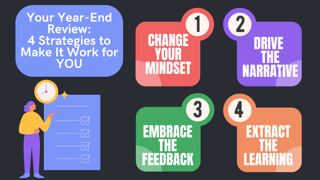The end of the year brings with it a host of traditions and rituals. Budgeting. Holiday events. And the annual performance review.
If you’re like most people, you’ll spend an average of 40 hours preparing for your review — an activity that 59% of employees report has ‘no impact’ on personal performance. Want to make 2022 the year that this changes? Want to approach the conversation differently so it delivers the clarity, closure and motivation you need as you wrap up 2022?

Consider making these four shifts to ensure that your investment — and the investment your manager is making — pays off in better results.
1. Change your mindset
Many of us have come to approach annual appraisals as passive consumers of review services. It’s something that’s “done to” us, something to be endured and reacted to.
Instead, view yourself as a co-creator of a productive experience designed to serve your needs. This immediately elevates the quality of the conversation and distinguishes you as a partner in your performance, feedback and learning. It sets the terms for a respectful and reciprocal relationship. It allows you to ask for what you want and need. And it ensures that the review becomes a tool that will help drive future performance and results.
2. Drive the narrative
Becoming a proactive co-creator of your review allows a whole new level of ownership and control — and demands a whole new level of preparation. If your organization offers a self-review form, complete it enthusiastically and robustly. Frequently, employees feel disappointed about doing their manager’s job and “writing their own reviews.” But let’s face it, even the best manager isn’t all-present or all-knowing. And wouldn’t you rather set the tone and frame the message in a way that spotlights your contributions in the best way possible?
Whether using a format provided by your organization or not, make sure to unapologetically share your accomplishments and what’s made you most proud over the past year. Be specific. Name names. Display data. Magnify metrics. Details matter. But beyond the objective results, make sure to connect the dots to include the impact of your behavior and results. How did your achievements help the team? The organization? Your customers? Help your manager vividly understand not just the “what” but also the “so what” of your performance.
This can be uncomfortable territory for those of us who tend toward humility and believe that “good work should speak for itself.” It does — but not loudly nor quickly enough to meet the needs of periodic reviews. So, eschew false modesty. It’s not bragging; it’s flagging important information that your manager might have missed and needs to know.
3. Embrace the feedback
The flipside of your perspective sharing is hearing the perspective of your manager (and perhaps others they’ve polled to contribute to the review.) This involves two distinct skills: remaining ferociously curious and demonstrating personal accountability.
Curiosity — a genuine sense of inquisitiveness and interest in what the other person is saying — is the antidote to defensiveness. And questions are the tools that help activate it. Use them generously with the intention to listen and understand (rather than respond and defend.) Breathe and take your time; the review isn’t a race. Allow yourself to explore and absorb the messages shared. And express appreciation for the information.
Personal accountability also makes it possible to embrace the feedback offered during a review. It’s disarming when a manager hears, “I take responsibility for that” instead of excuses. And employees who courageously demonstrate this level of accountability distinguish themselves as smart, connected to the big picture, trustworthy and caring.
That said, you must in many cases acknowledge the objective reality of missed expectations and goals as a result of factors that fall well beyond your control. In these cases, you can remain accountable and drive the narrative in a positive, and future-focused direction with this three-part formula.
- Here’s what I did: This focuses on the actions you took that might not have led to optimal success.
- Here’s what I should have done (upon reflection and with perfect hindsight): This demonstrates serious reflection and learning from the experience.
- Here’s what I’ll do in the future: This builds trust that mistakes or shortcomings of the past won’t be repeated.
4. Extract the learning
The fundamental and most productive purpose of annual reviews is to drive insights that can be applied to improve performance and results. So, don’t allow learning to become lost in the litany of achievements and activities. Take the time to step back to determine how you’ve grown and how you can use the past year’s experiences for future growth.
We all know that difficulties, setbacks and mistakes offer powerful lessons and opportunities for development. As a result, unpack those fully and be prepared to articulate them eloquently. But don’t ignore the lessons that can be found within your successes. What did you learn from that project that went well? Are there any best practices you derived from that highly effective initiative that you can bring forward? What will you make sure to do again in the future to drive similar results?
Translating events and activities into learning demonstrates a thoughtful, reflective approach to work. It highlights your leadership, strategic perspective and understanding of the business. It also can pre-empt and reframe feedback, offering a constructive and self-driven future focus.
Sure, year-end reviews are likely an organizational requirement. But more fundamentally, they’re a tool for you that inspires reflection, celebration, learning and planning for future success. When you change your mindset, drive the narrative, embrace the feedback and extract the learning, you’ll transform these conversations from dreaded administrative endeavors to a year-end tradition to be embraced and enjoyed.

If you’re a manager who wants to help your employees make the most of their year-end reviews, download this complimentary e-guide, Collaborative Year-End Reflections: Transforming Performance Reviews and Development Planning Meetings into Your Most Consequential Conversations of 2022.
Julie Winkle Giulioni is a champion of growth and development in the workplace, helping leaders and organizations optimize the potential of their people. Named one of Inc. Magazine’s top 100 leadership speakers, she’s the co-author of the international bestseller “Help Them Grow or Watch Them Go: Career Conversations Organizations Need and Employees Want” and a forthcoming book, “Promotions Are So Yesterday,” published by ATD Press. Learn more about her work at JulieWinkleGiulioni.com.
Opinions expressed by SmartBrief contributors are their own.
_______________________________
If you liked this article and video, sign up for SmartBrief’s free email newsletter on leadership. It’s among SmartBrief’s more than 250 industry-focused newsletters.
